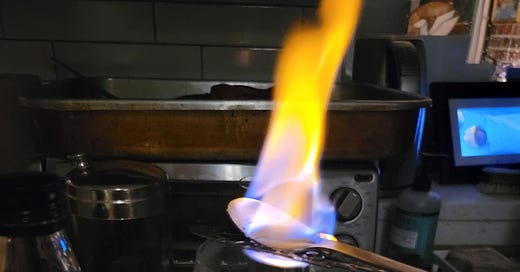Hello friends. How do you feel about anger?
I have done a lot of work with anger; I have a lot more work to do.
Historically I’ve been a lot less afraid of my sadness, or of my fear itself, than I am of my own anger. Maybe this is because of how I was reared, as a girl, in the South, or in my own particular family.
For many years I had trouble even recognizing my own anger. I most often let it out tamped-down, in annoyance, frustration; sideways, in sarcasm or sadness; I let it sit until it dried out and curl up at the edges, into little sour cakes of resentment; I aimed it out at faraway abstract forces and strangers on the Internet I would never have to confront.
More recently, I started expressing it more directly, more often. That’s been hell.
My therapist explained to me recently that my habit of walking around rehearsing conversations with people, in my head or even out loud, is coming from repressed rage. It’s more helpful to vent to a friend, at whom I am not angry, someone who can validate my feelings.
Sometimes, that’s enough; the anger blows off like steam. But sometimes there is still a boundary violation, or some real unfairness, that I need to work out directly with the person I am angry at— but carefully, without blistering them or punishing them with unfiltered rage.
This is the part I’m finding hard. I need to take a cool-off period but also, not wait too long (see, resentment). I need a safety course. I need tongs and good protective mitts.
What is anger good for? Audre Lorde takes up that question in “The Uses of Anger.” Her response to racism is anger. She says it’s not to be feared. When she expresses anger toward the racism of white women in the feminist movement, there’s a relational motivation. She says anger can be a spotlight, turned on others, for growth and “corrective surgery.”
Anger is a kind of power and sometimes the only kind of power that people without power have.
"I have suckled the wolf’s lip of anger and I have used it for illumination, laughter, protection, fire in places where there was no light, no food, no sisters, no quarter. We are not goddesses or matriarchs or edifices of divine forgiveness; we are not fiery fingers or judgments or instruments of flagellation; we are women forced back always upon our woman’s power.”
The link from anger to climate activism is seven times stronger than the link from hope. Anger is a just and fitting and empowering response to the degradation of our earth by powerful, oblivious, greedy, liars.
In the fourth episode of We Are The Great Turning, the podcast I produced with Joanna Macy and Jess Serrante, we move in to what is, for me, the heart of The Work That Reconnects: honoring our pain for the world.
And it starts with a moment where Joanna, 94 years old, gets furious at the Biden administration allowing oil drilling in the pristine Alaskan wilderness. (Biden recently took some mitigating actions to protect some of the nearby area; you can send a letter “expressing frustration” to stop the Willow Project at this link. )
Joanna wonders aloud about the use of anger, and also compares her anger to energy.
Oh, I wish I could have this anger be useful for something. Take it. I have a lot more to come. You want my anger? It's not gonna stop. You know, you could get something that'll ignite on any temperature. You could scratch it on anything.
Jess responds: I think you should call them and tell them that you have a renewable resource that is more powerful than the oil that they’re gonna drill for.
Joanna: I have found, I have experienced new dimensions of the volatility and, uh, energy, power of this new resource, which is my contempt for you.
As Jess reminds us later on in the episode, honoring our pain doesn’t mean enshrining it. We give it time and space, and it changes.
Thinking of anger as energy or power works well for me. There is clean energy and dirty energy; “clean” anger is clear about its origin and its object. Energy needs to be wielded with great regard for safety, protection, grounding. With anger you need to take similar precautions; understand the path it will travel, direct it wisely, lest it run a destructive course.
Some Links
I was on a daytime talk show, the Tamron Hall show, talking about parenting and technology.
I published an article in New York Magazine about people using Facebook to find sperm donors. Kind of far afield of my usual work here, but I loved challenging my assumptions about the women who would do this.
I gave a talk to the project directors’ meeting of the Covenant Foundation, which funds Jewish education, about confronting climate emotions. It felt really aligned and wonderful to be there. I’m taking on some consulting and advising work in the youth/education space, as well as giving talks, so let me know if you want to work with me!






